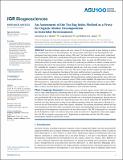An assessment of the tea bag index method as a proxy for organic matter decomposition in intertidal environments
Abstract
Intertidal wetlands capture and store carbon (C) for long periods of time, helping to reduce the concentration of CO2 in the atmosphere. Yet the processes which govern the decomposition and subsequent long‐term storage of organic matter (OM) and C in these habitats remains poorly understood. The Tea Bag Index (TBI) uses a standardized OM (green and Rooibos tea) and has the potential to shed light on OM decomposition across habitats, including saltmarshes. Here, we apply the TBI method at two saltmarshes within the same estuary with the aim of (i) reducing the influence of climatic variables and (ii) determining the role of the environment, including the soil characteristics, in the decomposition of OM. We extended the standard (3 months) incubation period over a full year in order to investigate the longer‐term decomposition processes at each site. The initial results partially support previous studies that the early stages of decomposition (leaching of the water‐soluble fraction) is governed by climatic conditions, but may be further enhanced by tidal flushing in saltmarshes. By extending the incubation period, we observed the initiation of mid‐stage OM decomposition (Cellulose degradation) upon which the soil characteristics appear to be the dominant control. These results highlight the importance of long‐term TBI incubations to understand early‐stage OM decomposition. The relationship between tea mass (OM) loss and C loss in these intertidal environments is not straightforward and we would caution the use of the TBI as a direct universal proxy for soil C degradation in such intertidal wetlands.
Citation
Marley , A , Smeaton , C & Austin , W E N 2019 , ' An assessment of the tea bag index method as a proxy for organic matter decomposition in intertidal environments ' , Journal of Geophysical Research - Biogeosciences , vol. Early View . https://doi.org/10.1029/2018JG004957
Publication
Journal of Geophysical Research - Biogeosciences
Status
Peer reviewed
ISSN
2169-8961Type
Journal article
Description
This work was supported by the Natural Environment Research Council (grant NE/R010846/1) Carbon in Storage in Intertidal Environments (C-SIDE) project.Collections
Items in the St Andrews Research Repository are protected by copyright, with all rights reserved, unless otherwise indicated.

